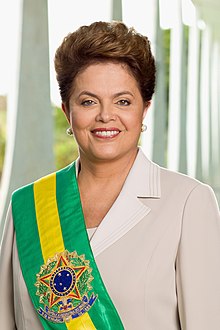 | |
| Presidency of Dilma Rousseff 1 January 2011 – 31 August 2016 | |
Vice President | |
|---|---|
| Cabinet | See list |
| Party | Workers |
| Election | |
| Seat | Alvorada Palace |
|
| |
The presidency of Dilma Rousseff began on January 1, 2011 with Dilma Vana Rousseff's inauguration as president after defeating PSDB candidate José Serra in the 2010 elections, and ended with her impeachment on August 31, 2016, already in her second term.[1][2][3][4]
The period was historic because it was the first time a woman had held the Presidency of the Republic in Brazil.[5][6] Initially, the government had 37 ministries in the first term and 39 in the second term, the largest number of ministries since redemocratization in 1985.[7][8][9]
In her first months in office, Rousseff contradicted the desire of sectors of her own party to regulate the press and declared that "a free media is essential for democracy".[10] Dilma's second term was marked by a serious economic and political crisis in the country, with GDP per capita shrinking by more than 9% between 2014 and 2016. In the year of her impeachment, the unemployment rate stood at 12%, while in 2010 it was 6.7%.[11][12][13] Even after her departure, the unemployment rate remained in the double digits for more than five years, falling only in March 2022, during the administration of Jair Bolsonaro.[14]
The Democracy Index, drawn up annually by the British magazine The Economist, ranked Brazil as the 47th most democratic country in the world in 2010, the beginning of the presidency of Dilma; in the 2013 ranking, it appeared in 44th place. According to the survey, 11% of the world's population lived in "complete democracies", which was not the case in Brazil, still considered an "imperfect democracy".[15][16]
- ^ "Raio-X das eleições 2010". UOL. 2010-10-31. Retrieved 2011-02-16.
- ^ "Dilma Rousseff é reeleita; eleitores comemoram pelo Brasil". Terra. Retrieved 2023-01-01.
- ^ Garcia, Gustavo; Calgaro, Fernanda; Matoso, Filipe; Rodrigues, Mateus; Lis, Lais (2016-08-31). "Senado aprova impeachment, Dilma perde mandato e Temer assume". G1. Retrieved 2023-01-01.
- ^ "Senado aprova impeachment, sela saída definitiva de Dilma e encerra mais de 13 anos do governo do PT". R7. 2016-08-31. Retrieved 2023-01-01.
- ^ "Dilma Rousseff toma posse como presidente do Brasil". BBC. 2011-01-01. Retrieved 2023-01-01.
- ^ "Dilma é exceção ao vencer primeira eleição que disputou". Estado de Minas. 2010-12-13. Retrieved 2011-02-16.
- ^ Spechoto, Caio (2022-12-04). "Lula deve começar governo com mais ministros que em 2003 e 2007". Poder360. Retrieved 2023-01-01.
- ^ "Com 37 ministérios, governo Lula fica atrás apenas do de Dilma, que teve recorde de 39". R7. 2022-12-29. Retrieved 2023-01-01.
- ^ "CONHEÇA DILMA E SEUS 37 MINISTROS". Congresso em Foco. 2010-12-30. Retrieved 2023-01-01.
- ^ "Dilma lembra ditadura e diz que ser jornalista é ato de coragem". Diario Online. 2011-02-22. Retrieved 2011-04-22.
- ^ "IBGE: taxa média de desemprego em 2010 foi de 6,7%". IstoÉ. 2011-01-27. Retrieved 2023-01-01.
- ^ Silveira, Daniel; Kometani, Pâmela (2017-05-31). "Desemprego fica em 13,6% em abril e atinge 14 milhões de brasileiros". G1. Retrieved 2023-01-01.
- ^ Loureiro, Marcelo (2017-03-07). "PIB per capita caiu mais desde 2014 do que em toda a 'década perdida'". O Globo. Retrieved 2023-01-01.
- ^ "Taxa de desemprego cai para 9,8% de março a maio". TV Brasil. 2022-07-01. Retrieved 2023-01-01.
- ^ Olivon, Beatriz (2013-03-19). "Noruega é país mais democrático; Brasil é 44º". Exame. Retrieved 2014-08-05.
- ^ "Brasil fica em 47º em 'índice de democracia' da 'Economist'". G1. 2010-12-17. Retrieved 2014-08-05.
© MMXXIII Rich X Search. We shall prevail. All rights reserved. Rich X Search

